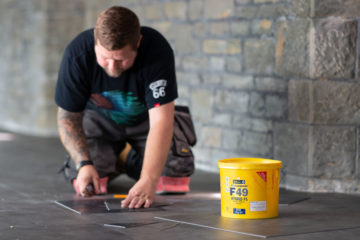When installing Luxury Vinyl Tiles (LVTs), it is useful to have the advantages of pressure sensitive adhesives, which afford high initial tack and a long open time. Previously, contractors wouldn’t have found these in combination with other benefits, such as temperature tolerant characteristics. Now, thanks to innovations in adhesives technology, high performance, pressure sensitive formulations are available with a range of additional features, helping contractors work to ever higher standards, with greater speed and efficiency.
Pressure sensitive adhesives are ideal for the installation of LVTs because they form an instant grab upon contact, so, once positioned, tiles or planks won’t move about as contractors work. They also offer an extended open time, reducing the risk of late placement and making them ideal for where more complex designs or patterns are being created. Such products are typically allowed to dry to a permanent tack before placing floorcoverings and are designed to give a high bond strength, which increases as it is trafficked.
Temperature tolerant requirements
There are instances where it will be more important to have the advantages of other solutions. For example, when installing floorcoverings in areas subject to extreme temperatures and temperature fluctuations, it is advisable to use a temperature tolerant adhesive.
High temperatures or extreme temperature fluctuations can cause floorcoverings to expand and contract significantly. This can be the case in conservatories or rooms with floor-to-ceiling windows, which are subject to ‘solar gain’, and may lead to unsightly tenting or gapping at the edges of floorcoverings, in particular LVTs, over time.
Temperature tolerant adhesives develop the high bond strength required to hold floorcoverings securely in place in such environments, ensuring a long-lasting flooring finish. However, these have traditionally been ‘wet-lay’, and contractors requiring this type of adhesive have had to forgo pressure sensitive benefits.
Hybrid solutions
In recent years, advancements in hybrid polymer adhesives have enabled the development of high performance vinyl adhesives with revolutionary combinations of properties, including temperature tolerance and pressure sensitive characteristics.
For example, Styccobond F49 Hybrid PS is a water-based, pressure sensitive vinyl adhesive that develops the extremely high bond strength and dimensional stability required to hold vinyl floorcoverings firmly in place in areas exposed to extreme temperature fluctuations (from -20°C to +60°C). Whilst providing high initial tack, the adhesive allows contractors to lift and reposition floorcoverings in the initial stages of drying, making it a great choice for installing tiles and planks, intricate patterns and bespoke designs that need precise alignment.
Fast-track formulations
Another way that innovations in pressure sensitive adhesives are helping flooring contractors reach new levels of professional standards is by shortening the time it takes to install floorcoverings, allowing them to meet challenges surrounding pressures to complete projects to ever more exacting time constraints.
Styccobond F58 PLUS, a fast-track, pressure sensitive adhesive for LVTs, transitions from a wet-lay adhesive when initially applied to a subfloor, through a semi-wet stage to become fully pressure sensitive.
The fast-drying formulation of Styccobond F58 PLUS enables LVT tiles and planks to be secured from just five minutes, while fibres in the adhesive provide resistance to lateral movement, preventing vinyl tiles and planks from moving around when working.
Checking floorcovering compatibility
Apart from letting the specifics of a particular project determine adhesive selection, always check the compatibility of particular floorcoverings and adhesives. For these purposes, F. Ball produces its industry-leading Recommended Adhesives Guide (RAG®). Alternatively, F. Ball’s technical service department are on hand Monday to Friday, 8.30am – 5.00pm, to answer your questions about F. Ball products and how to use them. Contractors can also consult floorcovering manufacturers for advice.
